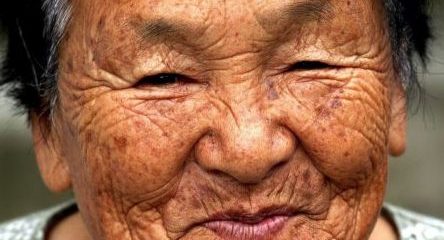Japan has many strange holidays. In the past there were religious holidays, but the government decided that religious days should not be celebrated as public holidays unlike all the other religions in the world like for instance the Christians who celebrate chrismas and other major Christian holidays, or the Jewish people who celebrate passover or Muslims who celebrate their sugar feast at the end of the fasting period. I could go on and on. Many countries celebrate their religious special days. Not so in Japan where there are rather peculiar holidays such as Greenery Day (みどりの日Midori no Hi ) or Health and Sports Day (体育の日 Taiiku no Hi).
Today (September 16th) is also considered a special day. Most people have the day off. Japanese use this day to celebrate Respect-for-the-Aged Day (敬老の日 Keirō no Hi). This national holiday was established in 1966 as a day to respect the elderly and celebrate long life. Originally held on September 15, it originated as a renaming of Old Folks’ Day (老人の日 Rōjin no hi?). In 2003, it was changed to the third Monday of September in accordance with the Happy Monday System. This national holiday traces its origins to 1947, when Nomadani-mura (later Yachiyo-cho, currently Taka-cho), Hyōgo Prefecture proclaimed September 15 Old Folks’ Day (Toshiyori no Hi). Its popularity spread nationwide, and in 1966 it took its present name and status. Annually, Japanese media take the opportunity to feature the elderly, reporting on the population and highlighting the oldest people in the country.
Haiku poet Masaoka Shiki (1867-1902), who was born in September and also died in September, penned this piece: “‘Ikimitama’/ 70 years old/ Still hale and hearty.”
“Ikimitama” refers to an old custom of honoring elderly members of one’s family with a celebration meal during the Bon season. In addition, as in Shiki’s haiku, the expression can be used to denote the elderly themselves.
Back in the Meiji Era (1868-1912), 70 was a ripe old age. If Shiki were to update this poem today, the age would have to be changed to 90, if not 100.
Japan’s centenarian population, which has been growing every year, is to exceed 54,000 this autumn. And some of these super-seniors are still active in various fields, changing my preconceptions about old age.
For instance, poet Masako Kinbara says in her book “Ara, Mo 102-sai” (Oh my, I’m 102 years old already) from Soshisha Publishing Co., “I feel that the older I get, the easier it gets to write freely.” Her works and way of life mirror her youthful sensibilities.
There is something sensual about this poem of hers: “Oh how irresistibly delicious my legs are/ I am an octopus.”
Another piece is evocative of something like a scene from a film. It goes, “At the foot of a rainbow/ Uniqlo and Lanvin embrace.” Lanvin is the French brand of high fashion clothes. Uniqlo is the Japanese brand of casual clothing. Of the embracing lovers, I wonder who is wearing Lanvin and who is wearing Uniqlo.
Everyone living now, young or old, is in the process of rewriting their own record of longevity. Sept. 16 is Keiro no hi, or Respect-for-the-Aged Day, a national holiday. Growing old isn’t all sweetness and light, obviously, but I’d like us all to renew our resolve to support and care for one another as our country continues to remain among the highest in the world in life expectancy.
To come back to ikimitama, the word seems to suggest someone who has already transcended the mundane. The Asahi Kadan poetry section of The Asahi Shimbun recently ran this piece by one poet: “This ikimitama is anti-war/ And has a sharp tongue.” This is exactly the way to go in one’s old age.
And here’s one by another: “Ikimitama/ Still reading Vox Populi, Vox Dei.” Sitting up straight and bowing my head in gratitude and humility, I pray for their health and long life.




